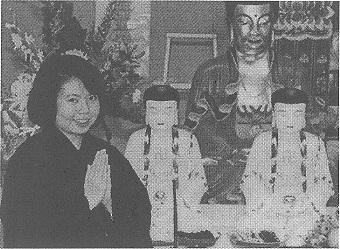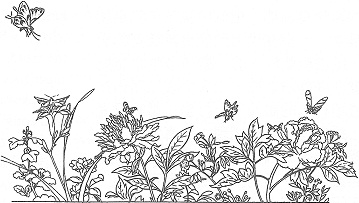|

「只要你心誠,無論你在什麼地方,我都會來教你的。」
我認為師父根本沒離開我們,他一直在暗中幫助我。說得更確切一點,透過閱讀他的書、我做的筆記和聆聽他的錄音帶開示,在在使我感到他對我的關心和指引;還有,當我遇到任何困難或遭受痛苦打擊的時候,只要張口呼喚師父,他都會回應我;他也會在夢裏教導我、提醒我、安慰我。他的無所不知,深化了我對他的信心,我常對著他的遺像和照片說話、禮拜,師父從無不應;這一事實,令我只有感動淚下的份兒。太不可思議了!他確實什麼都知道──舉凡我的種種念頭和遭遇。當我哭泣的時候,他立刻令我去讀他對彌勒菩薩作的偈頌:
你要問我笑甚麼 我先問你哭什麼
哭笑原非中道義 執著兩邊做甚麼
一口喝盡愁怨水 雙眼看破名利人
菩薩面目無人識 交臂失之自磋跎
〈錄自《上宣下化老和尚追思紀念專集》卷二第326頁〉
讓我再舉個例子,證明師父的無所不知吧!有一次,在萬佛聖城做晚課的時候,我感覺很噁心,我懷疑自己吃進去的那些外人帶來的素食,其中可能有蛋;家母看到我那難看的臉色,非常苦惱和難過,就在供桌前好好訓了我一頓。課誦完畢,我回到寮房,翻開經本,師父開了一帖法藥給我,證明母親的責備沒錯,他說得很妙:「不要打那麼多妄想!窮打妄想,頭髮會變白。」不可思議吧?
有一次,我決定開始試試雙盤。本來我以單盤的姿勢,最多只能坐上兩個小時。此時,我突然產生一股衝動,跑去將我從前在「法界大學」讀書所作的筆記給挖出來。這些筆記已擱在箱底好多年沒去觸碰了。正在披閱的當兒,一段話躍入眼簾,是師父1976年的打坐開示,他說:
「你若能打上雙盤那最好,單盤也可以。修行不是腿的問題,是心的問題。如果你心裡沒有染污的念頭,那麼不論你用什麼姿勢,你都在用功;如果你有染污的念頭,不管你用何種姿勢,都不會有感應的。修道就是修心養性。修心,就是省視你的妄念,迴光返照,省察自身。看看你有什麼樣的念頭──是貪、是瞋、還是癡?如果你心念清淨,那你就會在用功上得到感應。無論你打的是雙盤、單盤、或散盤,你真正要做的事是:克制你的妄念。妄念制服了,智慧就現前;妄不除,真不顯。」
當我開始鑽研佛法時,博學多聞是我的主要著眼點,所以特別側重學理的探討,而忽略了依教實行。我不知道真正的修行,乃是解行合一的。通過經典,師父點醒我「老實修行」的重要:
「你若知道許多佛法,卻不去行,那無有是處的;反之,你若知道一點兒,就能把這一點兒給行出來,那才真有用!」
師父一再重申修行的重要。
「學佛法,一定要真正實行。」〈《華嚴經》第39品之二,第109頁〉
又說:
「經教若沒有落實在日用中,那麼,經是經、你是你,絕對達不到『圓融無礙』。學以致用,是佛教裡面最重要的部分。」〈《華嚴經》第39品之二 ,第216頁〉
又說:
「學佛法,光是能知不能行,那不夠的!你一定要躬行實踐。」〈《華嚴經》第39品之五,第216頁〉
還有:
「你若只求信解經義,卻不修行,這沒有用的。佛法首重實行…,我們若是知道一分,就該把這一分行出來。知兩分,就行兩分。知與行之間應該沒有扞格…」〈《華嚴經》第11品,第二頁〉
我恰巧也讀到師父作的一首偈頌,叫做「聞法不修行」,它是這樣開頭的:
終日聞法未修行
如聾若啞麻木了
他說,我們天天學佛法,可是卻不修行,這就好比啞巴、聾子或白癡一樣。君不聞:「有耳不聞圓頓教,有眼不識盧舍那。」
他還說:
「…聞法有何用?我們如果不是為了要修行而聞法,那又何必浪費時間呢?我們天天忙著來聞法,又不按照所學的修…行為與所學相抵觸。所以,我只能說這種人就好像啞巴、聾子或白痴似的。」
師父又稱讚一位來自香港的居士,說他是「一位能將信念化為修行的人」、「真正的修道人」、「佛教行者」。他還說:若佛教徒個個都能像他一樣,那佛教就會一天天地興盛起來。可惜並非每位佛教徒皆能充分體認「把經義化為修行」的必要。(《華嚴經》第39品之六,第14頁)
他進一步又說:「你若能修持佛法,就是護持師父。」 (《華嚴經》第39品之五,第74頁)
沒有善知識經常的提領,我們很輕易便會偏離正道和中道,而迷失目標,走向極端。我真幸運有師父一直監督著我,看我是打妄想啊?是進、是退?也察看我的毛病。
我試圖改變自己的壞習氣,可是沒有完全放得下。俗語說:「本性難移。」我確有努力自新,可是無論我如何辛苦地想改過,它們依然「春風吹又生」。有些時候,我甚至替自己的過失找藉口,為自己錯誤的行為和不當的念頭做辯護律師;不過,內心深處,我知道自己不對,並且恥於承認。一個夜晚,在「萬佛聖城」的聽經時分,師父沉緩地說道:
「如果我是老師,有學生不聽我的話,我知道那是因為我沒有德行的緣故。」
聽了他的話語,我感到十分慚愧;師父沒有罵我不聽話,反而怪他自己缺乏德行。我心想:「師父,不是您沒有德行;是我沒照您的教導做,惡習實在是太難改了!」之後,我為自己沒能遵從他的教誨而懺悔。此事逼使我日後好好依師父教誨,去改善自己。
我如饑似渴般的吸收了他老人家的良教,並勤力運用於日常生活中。例如,我已不再對那些衝我來的惡意言辭、嘲諷有所反應;我學會如何充耳不聞,如偈中所說:「耳聽塵事心不知」。不過,初發心勇猛易,持之以恆難。隨時間之流逝,我很快地把學到的忘得一乾二淨;考驗臨頭,我會渾然不覺。有時候,師父會給個預告──考驗就要來了;其他時候,他則讓我坐待考驗發生,間接地透過讀他書、聽他錄音帶等等,來教我明白。
提到這個,有件事可以拿來說說。某人跟我說了些頗不中聽的話,這種不客氣的指責,令我深感傷害;可是,我力持鎮定,一言不發,待回到自己的房間,才無聲啜泣起來。第二天,師父給我開了一帖良方…
「你的分別心太重…人家罵你,你就哭!你何必要分別這是好事、是壞事呢?你應該把稱讚、罵辱看作一樣,要如如不動嘛!」
(《華嚴經》第9品,第122-3頁)
待續
|
|
“As long as you are sincere, I will go to teach you no matter where you might be.”
I believe that Shr Fu did not leave us at all. He constantly aids me in unseen ways. To be more precise, I feel his concern and guidance for me through reading his books, my notes, and listening to his taped lectures. Also, he responds whenever I call his name in times of difficulty, pain or distress. He will also come in dreams to instruct, warn, console me etc. His omniscience has deepened my faith in him. I would often speak and bow to his image and photograph. The fact that he never fails to respond really moves me to tears. It is uncanny but he truly knows everything – my feelings, experiences etc. When I cry, he immediately lets me read his verse on Maitreya Bodhisattva:
If you ask me why I’m laughing,
Let me first ask you why you are crying.
Crying and laughing are not the Middle Way.
Why should we be attached to the two sides?
In one gulp, he swallows the tears of sorrow and resentment.
His two eyes see through those who involve in fame and gain.
No one recognizes this Bodhisattva. They all miss him at arm’s length.
They are still wandering about wasting time.
[In Memory of the Venerable Master Hua, Vol.2, p. 326]
I would like to relate another incident which confirms that Shr Fu is omniscient (all-knowing). Once during evening recitation in CTTB, I had the horrible and suspicious feeling that I may have ingested eggs hidden in some vegetarian food that was bought by an outsider. My mother was unduly afflicted and upset on seeing my troubled look. She gave me a piece of her mind and lectured me in front of the altar. After the recitation, I went back to my room and opened my Sutra. Shr Fu gave me a dose of Dharma medicine and reaffirmed my mother’s scolding. He said aptly, “Don’t have so much false thinking. If you do, your hair will turn white.” Isn’t this inconceivable?
Once, I was determined to sit in full lotus. Before that, I could only sit in half-lotus for a maximum of two hours. For no apparent reason, I suddenly had the urge to dig up my old notes taken while I was a DRBU (Dharma Realm Buddhist University) student. These notes were kept at the bottom of my cupboard and had lain untouched for many years. When I went through the notes, I came across a Chan talk by Shr Fu in 1976. He said,
“Best if you can sit in full lotus. Half-lotus is also O.K. Cultivation isn’t a question of legs but your mind. If you don’t have polluted thinking in your mind, then whatever posture you’re in, you are still using effort. If you have polluted thoughts, you’ll not get any response regardless of whatever posture you are in.
“Cultivating the Way is cultivating the mind and nurturing the nature. Cultivating the mind is contemplating your false thoughts. Return the light and look within; investigate yourself. See what kind of thoughts you have more of – is it desire, greed, anger or ignorance? If your thoughts are pure, then you’ve a response from your effort.
“Whether you sit in full or half-lotus or both legs down, what you really want to do is to SUBDUE your false thoughts. When subdued, your wisdom can then manifest. If the false is not gotten rid of, the true cannot manifest.”
When I started to investigate the Buddhadharma, erudition was my main emphasis. I concentrated on Buddhist studies but neglected to put the principles into practice. I failed to realize that true cultivation is an integration of understanding and practice. Through the Sutras, Shr Fu reminded me of the importance of truly practicing what is learnt:
“If you know a lot of Dharma but fail to practice it, it’s useless. However, if you know a bit and is able to put that bit into practice, it’s really useful.”
The importance of practice is reiterated in his statement,
“In studying Buddhadharma, you’ve to truly put it into practice.”[Flower Adornment Sutra (FAS) Chap 39 II, p. 109]
He also said,
“If you do not fully incorporate the Sutra’s teachings into your daily life, then the Sutra is the Sutra, and you are you, and there is no ‘perfect penetration and mutual non-obstruction.’ You’ve to digest all that you learn and put it into practice. That is the most important part of Buddhism.” [FAS Chap 39 II, p. 48]
And again,
“It’s not enough to just know these principles but be unable to apply them on a practical level. The Dharma has to be practiced.” [FAS Chap 39 V, p. 216]
Also,
“If you only believe or understand the principle, but do not go ahead and cultivate, it is useless. The Buddhadharma has to be practiced… If we know one fraction, we should cultivate that fraction. If we know two, we should cultivate two. There should be no disharmony between knowledge and practice…” [FAS Chap 11, p. 2]
I also happened to read a verse composed by Shr Fu called “Listening but not Practicing the Dharma.” It starts like this,
Listening to the Dharma everyday but not cultivating,
It is not different from being mute, deaf or numb…
He explains that we learn Buddhadharma everyday, but we do not cultivate. It’s just like being mute, deaf or numb. As the saying goes, “Having ears but not hearing the perfect and sudden teaching and having eyes but not seeing Vairochana Buddha.”
He continues,
“...what’s the use of listening to the Dharma? If we listen not because we want to practice it, why then do we waste our time to listen to the Dharma? Everyday we are busy listening to the Dharma, but we never cultivate in accord with what we learn…our behavior contradicts what we learn. Thus I can only say that people like this are just like being mute, deaf or numb.”
Shr Fu also praised highly a layman from Hong Kong, referring to him as, ‘One who puts into practice what he believes,’, ‘a person who truly practices,’ and ‘a practitioner within Buddhism.’ He also commented that if everybody within Buddhism can be like this, then Buddhism will flourish day by day. But it’s a shame that not everyone within Buddhism fully appreciates the need to actually put principle into practice.’ [FAS Chap 39 VI, p. 14]
He further comments,
“If you can uphold and practice the Buddhadharma, then you are really protecting your teacher.” [FAS Chap 39 V, p. 74]
Without the constant reminder and guidance of a Good Knowing Advisor, it’s easy for us to stray from the correct path and the Middle Way, to lose focus and tend towards extremes. I’m truly fortunate to have Shr Fu constantly checking on me, whether I’m progressing or retreating, on my false thoughts, bad habits etc.
Somehow, although I try to change my bad habits, I couldn’t totally put them down. As the adage goes, “Old habits die hard.” I do make effort in renewing myself for the better. However, as hard as I try to suppress my faults from ever arising again, at times they will creep up again. Sometimes I even make excuses for my faults and rationalize my wrong deeds or improper thoughts. But deep within me, I know that I’m wrong and am ashamed to admit this. One night during the taped lecture in CTTB, Shr Fu said very calmly and slowly,
“If I’m a teacher and my disciples fail to listen to me, I know that it’s because I’ve no virtue.”
When I heard his words, it really moved me to shame. Shr Fu didn’t scold me for not listening to him, but blamed his lack of virtue. In my mind I had the thought, “Shr Fu, it’s not because you have no virtue; the reason for me not according with your teachings is because it’s difficult to change ingrained bad habits.” Later, I repented for failing to follow his teachings. This incident propelled me to change myself for the better according to Shr Fu’s teachings.
I would zealously absorb these superb teachings and diligently put them into practice in my daily life. For instance, I didn’t react to verbal abuse, cynical sarcastic remarks hurled at me. I tried to hear as if not hearing, as the verse goes, “The ears hear defiling sounds, but the mind does not know.” However, it is easy to be vigorous in the beginning but hard to maintain it as you go along. As time lapses, I will soon forget what has been learned and when an unexpected test comes, I will be caught unaware. Sometimes, Shr Fu will give a pre-warning of an imminent test. At other times, he will let me sit for the test and let me know indirectly how I fared through his books, tapes, etc.
To illustrate this, someone said some very unpleasant remarks to me. I was deeply hurt by the accusation and ingratitude. However, I managed to regain my composure and said nothing. I went back to my room and later cried silently. The next day, Shr Fu gave me a good dose of medicine…
“The discriminations in your mind are too heavy… If someone scolds you, then you cry. Why do you need to recognize things as good or bad? You should see praise and scolding as being the same. You should be thus, thus unmoving.” [FAS Chap 9, pgs 122-3]
To be continued

|